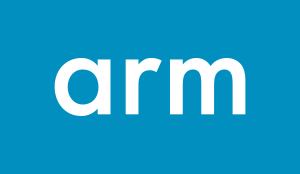ARM
From PCGamingWiki, the wiki about fixing PC games
Revision as of 11:53, 27 May 2021 by Dandelion Sprout (talk | contribs) (Considering I'm seemingly among the world's most knowledgeable people on ARM PC games, I figured I could just as well write this small guide.)
 |
|
| Developers | |
|---|---|
| Arm Ltd. | |
| Release dates | |
| Linux | February 24, 2012 |
| Windows | October 26, 2012 |
| macOS (OS X) | November 10, 2020 |
Key points
- Energy-efficient, which makes it suited for laptops and tablets.
- Very limited range of hardware as of May 2021, with virtually no mid-range desktop PCs.
- Drivers for graphics cards and gaming may not be easily accessible, if at all.
- Very few third-party storefronts support native ARM games.
Hardware
| Hardware type | OS support | Other notes |
|---|---|---|
| Raspberry Pi | Linux, fan-modified versions of Windows 10[1] |
|
| Other microcomputers | Linux | |
| Apple Silicon M1 Mac | OS X, Windows 10 |
|
| Windows tablets | Windows 10, Windows RT |
|
| Phones and tablets designed for Android | Linux |
|
Operating systems
| Operating system | Official support | Installation methods | Software support |
|---|---|---|---|
| Windows 10 | ARM builds are in beta as of May 2021. Actively developed. Not to be mistaken for Windows 10 IoT, which is a far inferior version that can't run any known games. |
• Official version (Requires Microsoft account and having joined the Windows Insider program.) • Raspberry Pi-specific fanmade custom versions |
All builds are ARM64, and have full native support for ARM32 and ARM64 software. Emulation of x86 is considered good; emulation of x86-64 is relatively new (Added in November 2020) and not much tested.[8] |
| Windows RT | No new models have been released since 2013. Support ends on January 10, 2023. | No known ways to install it on systems that weren't shipped with it. |
|
| macOS | Stable from 11.0 Big Sur onwards. Poised by Apple to completely replace x86-64 in the long term. | No known ways to install it on systems that weren't shipped with it. | All builds are ARM64, and have full native support for ARM64 software. Emulation of x86-64 is mostly good, but not always.
|
| Linux (Debian-based) | High degree of support, with a majority of native repository packages supporting it, and increasingly more distros adding ARM64 builds. | Downloaded from the distros' homepages, and can run from USBs and memory cards. Imager tools exist to simplify the process.[9] | ARM32 (armhf) and ARM64 (aarch64) builds exist. ARM64 builds can run ARM32 software with multiarch.
|
| Linux (Red Hat-based) | Most distros have high ARM64 package support, sometimes having packages that Debian-based ARM distros lack. | Downloaded from the distros' homepages, and can run from USBs and memory cards. Imager tools exist to simplify the process.[10] | ARM32 (armhf) and ARM64 (aarch64) builds exist, with priority given to ARM64.
|
Storefronts
| Storefront | OS | ARM game support | ARM game searching |
|---|---|---|---|
| Microsoft Store | Windows 10, Windows RT | Most non-'Game Pass' games released between 2012 and early 2016 have native ARM support. Native support in other games is spotty. | No known way to filter searches to native ARM only. PCGW's list of Windows ARM games is a de facto substitute. |
| Mac App Store | OS X | A few games, both ones intended for Mac and iPad, slowly began adding Mac ARM versions/support in game updates from early 2021 onwards. | No known way to filter searches to native ARM only. |
| itch.io | OS X, Linux | A few games offer OS X and/or Linux ARM versions, and they are technically able to add Windows ARM versions as well. | Search filters for ARM are very limited. Searching for raspberry pi in the top bar is one of few half-functional options. |
| Snap Store | Linux | Around half the games offer ARM versions, mostly due to the large overlap between Snap Store and distro repositories. | No known way to filter searches to native ARM only. |
PCGamingWiki resources
- AppleGamingWiki aims to cover M1 Macs in general, including emulators and non-Mac operating systems.
- ARM API fields were added to PCGamingWiki in May 2021, ready for use on pages about individual games.
- PCGamingWiki's native ARM support lists: Windows, OS X, Linux
References
- ↑ How to Install Windows 10 on a Raspberry Pi 4 - last accessed on 2021-05-27
- ↑ Jetson AGX Xavier Developer Kit - last accessed on 2021-05-27
- ↑ Linux Support on Apple's M1 Macs Set to Arrive via New Kernel - last accessed on 2021-05-27
- ↑ https://www.anandtech.com/show/16697/qualcomm-shows-off-snapdragon-dev-kit-for-windows-on-arm-development - last accessed on 2021-05-27
- ↑ https://medium.com/@quantvc/running-debian-on-android-device-natively-73545c9b0757 - last accessed on 221-05-27
- ↑ How to Run Linux on Android Devices - last accessed on 2021-05-27
- ↑ Pinephone - last accessed on 2021-05-27
- ↑ Windows on Arm: This is how well 64-bit emulation is working - last accessed on 2021-05-27
- ↑ Introducing Raspberry Pi Imager, our new imaging utility - last accessed on 2021-05-27
- ↑ Fedora Media Writer - The fastest way to create Live-USB boot media - last accessed on 2021-05-27
